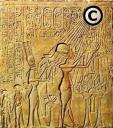 An update to this entry on Egypt proposed law to copyright their ancient artifacts. Eric Kansa at iCommons has a piercing analysis of the law as an instrument of nationalism, a way for countries whose cultural patrimony has been used by external powers for centuries to get a little of their own back via intellectual property legislation.
An update to this entry on Egypt proposed law to copyright their ancient artifacts. Eric Kansa at iCommons has a piercing analysis of the law as an instrument of nationalism, a way for countries whose cultural patrimony has been used by external powers for centuries to get a little of their own back via intellectual property legislation.
It’s understandable because the U.S. and the European Union have long advocated intellectual property maximalism (expanding the scope and reach of copyright and patents), usually to the disadvantage of the developing world. The Egyptian case, in many ways, reflects a growing trend on the part of the “Global South” to attempt to use their own versions of intellectual property protectionism for their advantage. For example, Peru has laws to regulate access to genetic resources of its natural heritage. Similarly, India has also enacted legislation to protect some traditional medical knowledge. The issue of “bio-piracy” in general reflects how nations in the developing world as well as some indigenous communities are attempting to use intellectual property legal frameworks to benefit from developments in biotechnology.
Egypt in particular has incentive to deploy IP in this manner, given how dependent the Egyptian economy is on tourism and how cash-strapped the Supreme Council for Antiquities is.
Egypt’s case is interesting, because of the complex role that the legacy of the Pharaohs plays in modern Egyptian politics and identity. Many Egyptians take great pride in the accomplishments of the ancient civilization on the Nile, but this view is also tempered by an Islamic world-view that sees the Pharaonic past as part of a pagan age of darkness and ignorance. In any event, Egyptian policy makers are acutely aware of both how the international IPR regime stacks the deck against them, and also how important antiquities are to their economy. The Supreme Council for Antiquities is resource-starved and has great difficulty paying for the upkeep and maintenance of thousands of monuments situated among a poor and rapidly growing population. Since tourism is so strategically important for Egypt, perhaps any competition in the tourist experience of Egyptian antiquities may be something of an economic threat – hence, the move to monopolise the legacy of the Pharaohs.
Anyway, read the whole article ’cause it’s smrt.